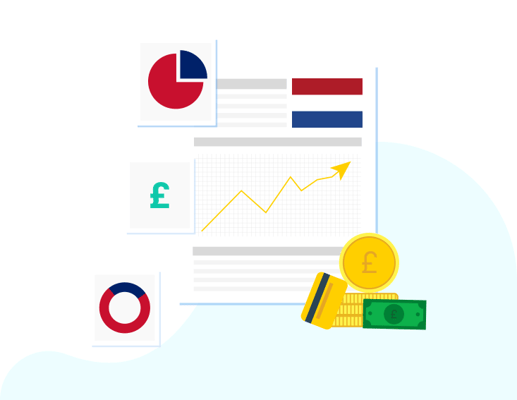Cash continues to be one of the most preferred payment modes in Nigeria. The rural population continues to use cash extensively, majorly because they lack the necessary knowledge to use the other payment modes.
However, to create awareness among the people, the Central Bank of Nigeria (CBN) is taking plenty of initiatives to enhance the outreach of payment options to the local populace. Another notable trend in this domain is the launch of basic and low-cost banking accounts, which will help optimize the payment infrastructure and change the habits of Nigerian consumers.
Despite all the shortcomings, the Nigerian economy continues to set milestones and achieve its growth parameters against them. The increasing use of smartphone penetration, expanding e-commerce, and government initiatives continue to help the economy adopt new technology wholeheartedly.
As per a recent survey conducted by Enhancing Financial Innovation and Access (EFInA), 36% of Nigerian adults are financially excluded, which presents a lucrative opportunity for entrepreneurs and fintech giants to flourish.
Furthermore, as per Nigeria Interbank Settlement System (NIBSS), Nigeria recorded a surge of 55% in electronic transactions, while the total number of users increased to 541 million in January 2023.
Top 3 Payment Methods in Nigeria
%20(1).png?width=1500&height=1234&name=Infographic%20-%201%20(13)%20(1).png)
1. Credit card/Debit card
Mastercard and Visa dominate the Nigerian market; these cards continue to be ruled by the regulations laid down by the Central Bank of Nigeria (CBN). However, this led to the rapid birth of an indigenous card, Verve, in 2011. Verve allows banks to process payments quickly but at a lesser cost.
To increase its acceptance in the Nigerian market, the payment provides support with more than 30 million payment tokens for consumers. There is another native brand that is competing against Mastercard, Visa, and Verve. The AfriGo is a result of the partnership between the Central Bank of Nigeria and the Nigeria Inter-Bank Settlement System.
At present, the Nigerian card market stands at $18.2 billion.
2. Bank Transfer
Nigeria's banking sector will experience unprecedented growth soon. The government is taking the proper steps to strengthen the fintech infrastructure and sustain this growth.
Since digital banking is becoming the new trend, there is a continuous effort to improve and make available digital banking services for consumers.
As per a 2022 press release, Nigeria made 3.7 billion real-time payments in 2021.
Close to 200 fintech companies within the country provide online access to mobile payments and other digital banking services.
The increasing use of bank transfers and digital methods has c aused a decline in the use of cheques within the country. The cheque usage volumes in January 2023 were 3.1 million versus 3.2 million in January 2022. The total usage value was N244 billion versus N237 billion in the previous period.
Nigerians can access various channels, such as Internet banking, bank branches, kiosks, mobile apps, Unstructured Supplementary Service Data (USSD), POS, and ATMs.
3. E- Wallets
E-wallets are a well-known payment mode in Nigeria, which consumers use for shopping online and in point-of-sale stores. In 2021, 7% of Nigerian e-commerce sales were completed using digital and mobile payments.
Some common mobile e-wallets include Google Pay, Samsung Pay, and Apple Pay. Some other renowned names include Naira.com, Chipper Cash, and Paga.
The mobile transactions increased to 108 million in January 2023 from 32 million in January 2022. This increase marks a 237 percent increase in the total volumes.
The ever-increasing use of mobile phones as channels and mobile payment schemes continues to sweeten the deal for local consumers. Between 2023 and 2025, the total mobile users will increase by 100 million subscribers.
Good Read: Top Payment Methods In Germany That Your Business Needs to Know
Local Payment Methods and Rising Complexities for Businesses
Nigerians face a cash crunch within the economy, so they need to adapt to the available digital resources within the country. However, with the rise in digital adoption, the platforms still need to become adept at accommodating every available person due to the unstable infrastructure, failed digital transactions, and lack of reliable electricity and internet connectivity.
Despite the rise of electronic payments in Nigeria, quite a few issues continue to break the economy's financial modes of payment. The electronic platforms cannot support many users, which often results in high volumes of failed transactions. With increased failed transactions, local consumers tend to refrain from using enhanced payment modes to conduct their daily payments.
Despite the challenges, the point-of-sale (PoS) volumes are already touching 96 million, marking a 6 percent surge from 90 million earlier. In a year-on-year comparison, the value of these transactions was N807 billion in January 2023 versus N573 billion in January 2022.
Additionally, the local populace must gain the basic knowledge and technical know-how to operate digital accounts, as they cannot exploit the digital era's full potential.
Another prominent issue is trust, which does not allow Nigerians to move towards better payment methods for their personal and professional use. The increasing online scams and frauds have given the entire concept of digital payments a bad name within the country.
As a business, engaging with a reliable payment facilitator is essential to ensure users benefit from digital payment methods without worrying about scams. Payment aggregators such as inai can help you achieve such goals quickly.
How inai Helps You With Nigerian Payment Methods?
inai is a unique payment method aggregator that networks with 300+ international payment methods. You can expect support for your customers, irrespective of their location, native currencies, and payment method preferences.
inai is ideal for both large-scale international and small-scale enterprises with nominal tech-knowhow. With inai, your business can avail a low-code/no-code payment method integration service. It helps you render a unified payment system that gives your customers a personalized transaction experience.
This payment integration tool guarantees PCI-DSS and GDPR-compliant service for your business, sales protection for you and your customers, and even a dashboard to maintain an end-to-end watch on sales and conduct analytics, amongst other things.
With inai, you can see a data-driven uptick in conversions and revenues.%20(1).png?width=2000&height=531&name=CTA%20(36)%20(1).png)
.png?width=123&height=71&name=inai%20logo%20-%20dark%201(1).png)
.png)




.png?height=400&name=Header%20-%20Top%20Payment%20Methods%20In%20France%20(1).png)